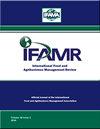Exploring how EU agri-food SMEs approach technology-driven business model innovation
IF 1.5
4区 经济学
Q3 AGRICULTURAL ECONOMICS & POLICY
International Food and Agribusiness Management Review
Pub Date : 2023-04-19
DOI:10.22434/ifamr2022.0122
引用次数: 0
Abstract
The EU agri-food sector, which is mainly composed of small and medium-sized enterprises has become more demanding in terms of technological inputs to reduce costs, improve the added value of food products, achieve sustainability issues, or address new market opportunities. The introduction of new technologies poses challenges for SMEs that lack the resources and time to cope with the technological transformation, which involves not only the assimilation of new technology in organizational processes but also business model innovation. In this context, this research aims to empirically explore the paths of agri-food SMEs engaged in the technological transformation process, based on the drivers and barriers, as well as the strategies used by these companies to overcome these barriers. In-depth semi-structured interviews with 14 EU agri-food SMEs were conducted and analysed using a combination of deductive pattern-matching and inductive approach. Based on similarities in terms of drivers, barriers, and strategies, seven main groups were identified to draw the paths of the technological transformation process for agri-food SMEs. Findings reveal that there is one common strategy that is adopted by all 14 companies, namely the employment of different types of partnerships and collaborations that allow companies to successfully enter new markets. The study contributes to the literature on technology transformation related to the agri-food sector, by proving insights into how EU agri-food SMEs cope with this process.探讨欧盟农业食品中小企业如何实现技术驱动的商业模式创新
欧盟农业食品部门主要由中小型企业组成,在技术投入方面的要求越来越高,以降低成本,提高食品的附加值,实现可持续性问题,或解决新的市场机会。新技术的引入对缺乏资源和时间来应对技术转型的中小企业提出了挑战,这不仅涉及在组织流程中吸收新技术,还涉及商业模式创新。在此背景下,本研究旨在实证探讨农业食品中小企业在技术转型过程中的路径,基于驱动因素和障碍,以及这些企业克服这些障碍的策略。采用演绎模式匹配和归纳相结合的方法,对14家欧盟农业食品中小企业进行了深入的半结构化访谈。基于驱动因素、障碍和策略的相似性,本文确定了七个主要群体,以绘制农业食品中小企业技术转型过程的路径。调查结果显示,所有14家公司都采用了一个共同的战略,即采用不同类型的伙伴关系和合作,使公司能够成功进入新市场。该研究通过证明对欧盟农业食品中小企业如何应对这一过程的见解,为与农业食品部门相关的技术转型文献做出了贡献。
本文章由计算机程序翻译,如有差异,请以英文原文为准。
求助全文
约1分钟内获得全文
求助全文
来源期刊

International Food and Agribusiness Management Review
AGRICULTURAL ECONOMICS & POLICY-
CiteScore
2.90
自引率
0.00%
发文量
0
审稿时长
>12 weeks
期刊介绍:
The IFAMR is an internationally recognized catalyst for discussion and inquiry on issues related to the global food and agribusiness system. The journal provides an intellectual meeting place for industry executives, managers, scholars and practitioners interested in the effective management of agribusiness firms and organizations.
IFAMR publishes high quality, peer reviewed, scholarly articles on topics related to the practice of management in the food and agribusiness industry. The Journal provides managers, researchers and teachers a forum where they can publish and acquire research results, new ideas, applications of new knowledge, and discussions of issues important to the worldwide food and agribusiness system. The Review is published electronically on this website.
The core values of the Review are as follows: excellent academic contributions; fast, thorough, and detailed peer reviews; building human capital through the development of good writing skills in scholars and students; broad international representation among authors, editors, and reviewers; a showcase for IFAMA’s unique industry-scholar relationship, and a facilitator of international debate, networking, and research in agribusiness.
The Review welcomes scholarly articles on business, public policy, law and education pertaining to the global food system. Articles may be applied or theoretical, but must relevant to managers or management scholars studies, industry interviews, and book reviews are also welcome.
 求助内容:
求助内容: 应助结果提醒方式:
应助结果提醒方式:


